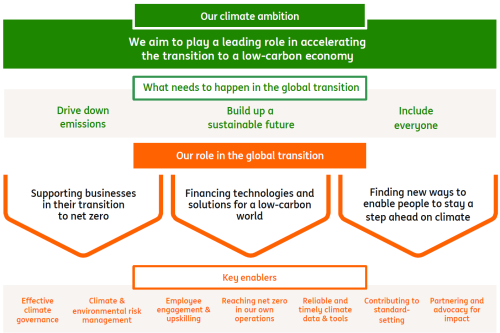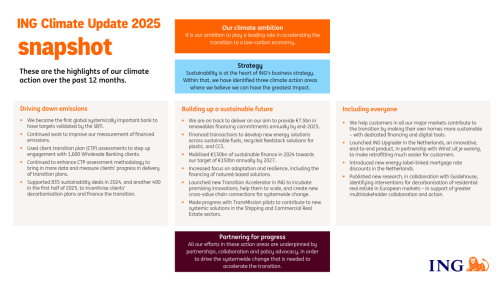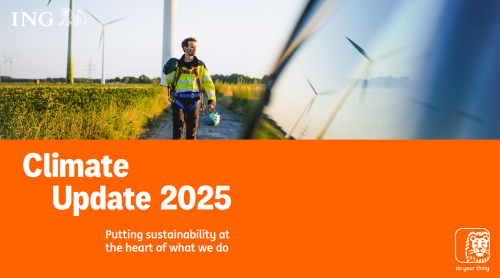Our climate approach
At ING, our climate ambition is to play a leading role in accelerating the low carbon transition. We’re stepping up action on climate because it matters to the bank, our customers and society.
We need to ensure the resilience and commercial success of our business which, in today’s world, includes managing the risks that are escalating with global warming. And with the global transition now underway, financing the new technologies, infrastructure and business models of the future economy presents a growing opportunity for us.
As a bank, the biggest impact we can make is through our financing. We’re focused on three areas for action:
- To drive down emissions, our greatest opportunity to accelerate progress is through working with our large clients on their transitions to net zero emissions.
- To build up a sustainable future, we’re stepping up our financing for innovative technologies and solutions needed for a low carbon world.
- To include everyone in the low carbon transition, we want to find new ways to enable people to stay a step ahead on climate.
Fossil fuels are at the heart of the climate debate. We are gradually reducing financing of fossil fuels in line with international climate guidance. We have already committed to phasing out our financing of oil and gas extraction and production to zero by 2040.
The reality today is that the world still runs mainly on energy from fossil fuels. So, although we finance a lot of sustainable activities – we still finance more things that aren’t green. But we’re always looking to take the next step to drive further progress to a low carbon future.
Climate change is a fast-moving challenge and, guided by the latest climate science, it’s all about working towards achieving net zero by 2050. Accelerating change will require systemwide solutions. That’s why we collaborate with others - including customers, other banks and policymakers.
The more we work together and learn from each other, the faster we’ll go.
Climate action in detail
At ING, our ambition is to help accelerate the transition. Our role in the global transition is focused on the three areas where we believe we can make the greatest impact, based on what needs to happen in the world:

Driving down emissions: supporting businesses in their transition to net zero
To drive down emissions and align with global climate goals, we believe that the most significant contribution we can make is through engaging with our clients to help them accelerate their transition.
For clients in the most carbon-intensive sectors, we realise their ability to shift can make the greatest difference. In 2018, we started what we call our Terra approach to set pathways for key sectors to reach net-zero emissions by 2050 – with intermediate 2030 targets. Terra is based on data and climate science and uses what we consider to be the best-fit methodology per sector. We continue to broaden Terra to have more impact, working to include additional carbon-intensive sectors and other parts of the value chain of already in-scope sectors.
The intermediate 2030 science-based targets we have set under Terra have been validated by the Science Based Targets initiative (SBTi), according to SBTi’s updated framework for banks (known as FINT Criteria V2), which came into effect end-November 2024. See full details of ING's SBTi-validated targets.
We’re also continually strengthening how we engage with our clients as they move to implementation of their climate transition planning. See our Climate Update 2025 for more information.
As society transitions to a low-carbon economy, so do our clients, and so does ING. The low-carbon transition cannot happen overnight. Even though we finance a lot of sustainable activities, we still finance more that’s not, which is a reflection of the current global economy.
Building up a sustainable future: financing technologies and solutions for a low-carbon world
To make the energy transition a reality, there’ll need to be trillions of euros of investment. We have a role to play here too, in financing the new low-carbon technology to meet net-zero goals – like renewable power, green hydrogen, energy efficiency, and energy storage. Building up the affordable supply of green energy alternatives is a necessary and powerful driver in reducing society’s dependence on fossil fuels.
Whether our clients are developing breakthrough technologies, new approaches to energy, waste and water management, or constructing green buildings and infrastructure, right across the bank we’re working to enable them to pursue their sustainability ambitions. We are using innovative financing solutions – from pioneering the world’s first sustainability linked loan back in 2017 to our leading-edge efforts today in working to make the supply chains in and across industries more sustainable.

Click on image to open readable PDF.
Including everyone in the transition: finding new ways to enable people to stay a step ahead on climate
At ING, we believe that most people want to play a positive part in the transition to a more sustainable future. We aim to keep finding new ways to enable people to stay a step ahead on climate. For example, through our mortgage portfolio, we finance the homes of a large number of people and that gives us the opportunity to help them to do that. We incentivise green home ownership through the mortgages we offer and recognising the great challenge of retrofitting existing housing stock, we’re increasingly supporting customers to upgrade their homes to become more sustainable and energy-efficient, as well as reducing their cost of living.
A dynamic landscape
Climate change is a complex and dynamic challenge, so our response needs to be dynamic as well. Just as scientific understanding is continually advancing, so our approach must keep evolving. Our focus is broadening to consider not only climate change mitigation but how we can also support climate adaptation. Responding to the climate crisis is not only about urgent action on the environmental impacts but also on the human impacts. We are actively working to support a fair and inclusive transition that respects human rights. Meanwhile, in the face of nature degradation, how to protect and regenerate natural systems is now an urgent concern globally. Safeguarding nature also supports climate mitigation and resilience, and ING is integrating nature into the processes we already have in place for climate action.
None of these challenges can be tackled in isolation. There are many interdependencies, and new solutions will require a systems-wide approach. So, it will be ever more important that, at ING, we are clear about the changing nature of the risks and opportunities ahead and keep reassessing how and where our efforts can have the greatest impact over the short, medium and long-term horizons.
Partnering for progress
The transition to a low-carbon economy has no single, simple solution. This is why progress can only be driven through concerted, collaborative action. We are eager to work with many different types of organisations wrestling with these difficult questions, from shaping policy agendas to creating innovative solutions. We want to share what we learn along the way, so we can all move faster. And, together with our partners, we’ll advocate for the systems-level change that is needed.
The experience and expertise on climate that we have built across the bank give us a springboard to keep pressing forward and increasing our impact. It is our ambition to play a leading role in accelerating the transition.
See our most recent Climate Update 2025 and our annual report for more information on our advocacy actions to engage with governments, policymakers and other stakeholders.

What’s the deal with fossil fuels?
We are gradually reducing financing of fossil fuels in line with international climate guidance. However around 80% of the world’s energy still comes from fossil fuels for things like heating, cooking, transportation and electricity. And while decarbonisation is crucial, the same is true for energy remaining affordable and the supply remaining secure.
We take a sector-by-sector, science-based approach and have already made important policy decisions when it comes to fossil fuels. We’ve accelerated the phasing out of financing upstream (exploration and production) oil and gas activities. These loans will be reduced by 35% by 2030 and will be zero by 2040. That’s ten years sooner than most scenarios.
We’re also reducing the financing of coal-fired power plants to close to zero by 2025, we stopped the general financing to so-called pure-play upstream oil & gas companies that continue to develop new oil & gas fields and restricted the financing of the midstream infrastructure that supports the development of those fields.
Guided by the IEA World Energy Outlook 2023, we've decided to stop providing new financing for new LNG export terminals after 2025.
The best way to reduce fossil fuel demand is to increase the availability of renewable energy. More than half of our power portfolio is already renewables and we set a target amount of €7.5 billion in annual renewables financing by 2025, which is a more than tripling of the-previous-target.
This website discusses one or more specific transactions and/or contains general statements about ING’s climate approach. The approach and criteria referred to on this website are intended to be applied in accordance with applicable law. Due to the fact that there may be different or even conflicting laws, the approach, criteria or the application thereof, could be different.
